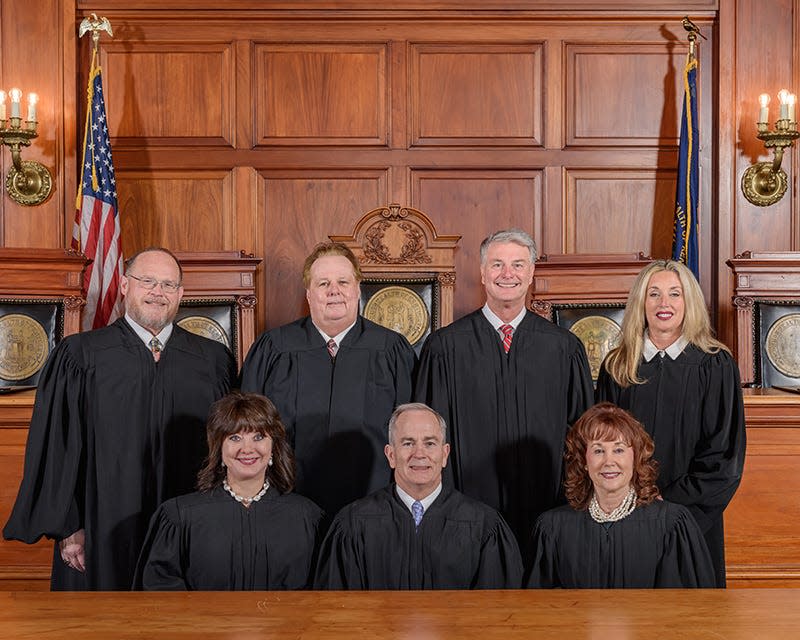Kentucky Supreme Court hears arguments on new venue change law, voices skepticism

The Kentucky Supreme Court heard oral arguments this week on a challenge to a new law that allows defendants to get certain cases switched to another randomly selected county, with the comments and questions of most justices appearing skeptical that it passes constitutional muster.
The venue law in question, amended by Senate Bill 126 in this year's session of the Kentucky General Assembly, allows defendants in lawsuits challenging the constitutionality of laws or executive branch actions to request the cases be transferred to another circuit — with the clerk of the Kentucky Supreme Court required to choose another court through a random selection.
Defendants in several prominent cases have subsequently requested such a transfer — including two challenges to a new ban on so-called "gray machines" and another lawsuit to block how schools handle the deductions of union dues. But those are now on hold until the Supreme Court rules on SB 126 in a supervisory writ.
The supervisory writ was requested by Franklin Circuit Judge Phillip Shepherd in April after the Attorney General Daniel Cameron's office requested to move the lawsuit of skill games maker Pace-O-Matic to a different county, which was objected to by the plaintiffs, represented by attorney Guthrie True.
Speaking before the justices in an oral hearing Wednesday, True argued that the changes of SB 126 violated a dozen sections of the Kentucky Constitution, arbitrarily denying the plaintiffs' due process rights to have the cases heard where they are filed — without any showing of bias about a judge in that court — and allowing the legislature to infringe the judicial authority of the Supreme Court.
"This is an arbitrary selection of venue that removes the court from its inherent power to do all things reasonably necessary on the administration of justice in the case before it," True said.
Matthew Kuhn, the solicitor general in the Attorney General's Office, countered that the General Assembly was "just leveling the playing field" on venue selection with SB 126, saying that "if the plaintiff gets to select, the defendant has the ability to take away that selection ... Nobody can get an advantage through venue selection."
Four of the justices peppered Kuhn with questions suggesting skepticism with that argument, both in terms of the constitutional rights of plaintiffs and the authority of the state's highest court, itself.
Regarding whether a mandatory change in venue to a random county is arbitrary, Justice Christopher Nickell said, "I can't imagine a more arbitrary process to establish venue than by establishing a venue lottery, in essence."
Also questioning its arbitrary nature, Justice Michelle Keller added she didn't see how a random selection by the court's clerk necessarily guaranteed "a more fair proceeding than the current regime, without some allegation of specific bias. I think that's where we're all struggling."
Kuhn replied that the legislature's reasoning for SB 126, "could not be more sensible," as "it is unequivocally a good thing for circuit judges from Pikeville to Paducah to decide constitutional challenges to government actions that affect all Kentuckians."
Several justices also took issue with Kuhn's arguments that the legislature was not overstepping the constitutional authority of the court, with Justice Kelly Thompson saying the General Assembly has not reached out to the Supreme Court on solutions to any perceived problems.
"What if we wrote a decision and told the clerk of the House of representatives how to assign legislation in the House of Representatives?" Thompson asked. "What would happen if we did that to their clerk? They're doing that to our clerk."
Justice Nickell added that he was "having a hard time wrapping my mind around how this is not an abdication of judicial authority."
Kuhn replied by suggesting the legislature had given the court "so much discretion in implementing Senate Bill 126" that it could alleviate any interference on the judiciary's power "through its ruling authority."
"What they're trying to do is a power-sharing arrangement," Kuhn said. "The General Assembly sets the terms, this court implements them."
Asked about a failed amendment to SB 126 that would have allowed cases to only be transferred to surrounding counties, Kuhn suggested the court could add such a feature to its ruling, or direct them to pass legislation in a future session that adds a more narrow set of counties cases could be transferred to.
"If this Court were to say that you have to transfer to a more convenient county, and tell our General Assembly to try again, I think that's a narrow way to approach this," Kuhn said.
True forcefully rejected that argument in his closing statement, saying the legislation clearly stated the Supreme Court clerk was required to make the random selection, with no room for interpretation.
"This statute must be stricken as unconstitutional, otherwise the boundary between the legislative and judicial magistrates will be forever difficult, if not impossible, to determine going forward," True said.
An amicus brief was filed Monday with the Supreme Court by the ACLU of Kentucky, Kentucky Equal Justice Center and Kentucky Resources Council in support of the plaintiffs’ argument against SB 126, as was an amicus brief by Republican House Speaker David Osborne and Senate President Robert Stivers in support of the legislation.
Until the Supreme Court rules on SB 126, the lawsuits challenging the ban on gray machines remain in limbo, as does the Kentucky Education Association lawsuit against Senate Bill 7, which prohibits schools from directing teachers' payroll deductions to their unions.
More: How a new Kentucky law is having a ripple effect on teacher union dues and gray machines
Reach reporter Joe Sonka at jsonka@courierjournal.com and follow him on Twitter at @joesonka.
This article originally appeared on Louisville Courier Journal: Kentucky Supreme Court hears arguments on new venue change law

